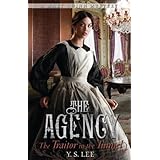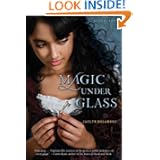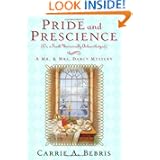What I've Read This Week . . .
Mary Quinn is now a full-fledged member of The Agency after two years. Her newest assignment is to investigate the disappearance of some small items from the Queen's drawing room. Serving at Buckingham Palace isn't easy with a mistrustful housekeeper, shrewish lady-in-waiting, disgusting equerries and an ambitious roommate. Mary knows enough to keep her eyes and ears open despite her difficulties. She becomes privy to the news that the Prince of Wales was out carousing with friends and stumbled into an opium den where the Prince's friend was stabbed by an old, opium addicted Chinese man - a man who happens to have the same name as Mary's father! While the Queen wants justice for the murder of an aristocrat or possibly treason, Prince Bertie won't share what he knows. Mary is determined to see social justice done even if the man is not her father. At the same time, Easton engineering is renovating the sewer tunnels under the palace and Mary and James encounter one another again. This time there's no denying the passion between them. Mary needs James' help again for she has discovered the presence of secret tunnels underneath the Palace which places the entire royal household in jeopardy. Mary and James must put personal feelings aside for now and determine whether someone means to use the tunnels for evil. Her search for answers leads her from the Prince's apartments, down into the sewers to the Tower of London where she uncovers difficult truths about herself and her identity. This is the best book of the trilogy. As usual the descriptive period details are amazing and really set the scene, especially in the sewers. Mary is a strong female character who I loved from the start. The author hasn't changed Mary in any negative way. Instead, Mary grows as learns to confront her issues. James too grows up while remaining as swoony as ever. The dialogue between Mary and James is top-notch and rather sweet and funny. The mystery of the murder was interesting and engaging but the other mysteries were less interesting mainly because I was intrigued by the secrets of Mary's past from the first book and was anxious for a resolution. The ending is not at all rushed and everything wraps up neatly - if not entirely historically accurately. I couldn't have written it better myself. I'm not sure there needs to be a fourth volume in the series but I look forward to reading it anyway!
The Traitor in the Tunnel by Y.S. Lee (The Agency 3) -- Young Adult Historical Fiction/Mystery
Mary Quinn is now a full-fledged member of The Agency after two years. Her newest assignment is to investigate the disappearance of some small items from the Queen's drawing room. Serving at Buckingham Palace isn't easy with a mistrustful housekeeper, shrewish lady-in-waiting, disgusting equerries and an ambitious roommate. Mary knows enough to keep her eyes and ears open despite her difficulties. She becomes privy to the news that the Prince of Wales was out carousing with friends and stumbled into an opium den where the Prince's friend was stabbed by an old, opium addicted Chinese man - a man who happens to have the same name as Mary's father! While the Queen wants justice for the murder of an aristocrat or possibly treason, Prince Bertie won't share what he knows. Mary is determined to see social justice done even if the man is not her father. At the same time, Easton engineering is renovating the sewer tunnels under the palace and Mary and James encounter one another again. This time there's no denying the passion between them. Mary needs James' help again for she has discovered the presence of secret tunnels underneath the Palace which places the entire royal household in jeopardy. Mary and James must put personal feelings aside for now and determine whether someone means to use the tunnels for evil. Her search for answers leads her from the Prince's apartments, down into the sewers to the Tower of London where she uncovers difficult truths about herself and her identity. This is the best book of the trilogy. As usual the descriptive period details are amazing and really set the scene, especially in the sewers. Mary is a strong female character who I loved from the start. The author hasn't changed Mary in any negative way. Instead, Mary grows as learns to confront her issues. James too grows up while remaining as swoony as ever. The dialogue between Mary and James is top-notch and rather sweet and funny. The mystery of the murder was interesting and engaging but the other mysteries were less interesting mainly because I was intrigued by the secrets of Mary's past from the first book and was anxious for a resolution. The ending is not at all rushed and everything wraps up neatly - if not entirely historically accurately. I couldn't have written it better myself. I'm not sure there needs to be a fourth volume in the series but I look forward to reading it anyway!
French Leave by Sheri Cobb South (Weaver Trilogy #3) -- Regency Romance


























